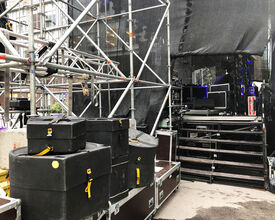Stage builder Stageco trades in two years of standstill for 'most complex summer ever'. After two quiet summers, Stageco is once again very busy. The logistical challenges are enormous.
“Hey, the van just left. The part should reach you by 8 p.m.' Tom Bilsen makes a measured call with one of his production chiefs in Paris. In the Stade de France the Belgian Stageco takes the stage for the tour of the very popular Indochine in France. An incorrectly welded part hinders the construction for the premiere concert. It was re-welded this morning in Stageco's workshop, in Tildonk (near Leuven), and sent straight to Paris.
The incident is indicative of the crowds at Stageco, now that the festival season is approaching. Tom Bilsen, director of operations for the Stageco group, shows on his smartphone some images of the Indochine stage, with a cylindrical video screen. Two weeks ago, the colossus was erected in Tildonk for a dress rehearsal. Not all neighbors could appreciate the noise.
Bilsen drives us around the 20 hectare site of Stageco, the worldwide market leader in stage construction. One trailer leans against the other in the large parking lot, loaded with parts that will be transported to just about all of Europe in the coming days. Signs on the trailers tell the destination: from The Barn (the large indoor stage at Rock Werchter), via the stadium tour of Soprano, a well-known French rapper who kicks off in Lyon, to the tour of Elton John. In the welding workshop, the last parts of the roof truss are finished that will hang over Elton John's head within two weeks. All over the large hangars, men are busy loading metal bars and cables into boxes or folding tarpaulins.
Survived Corona
After two years without major concerts and festivals, the event sector is about to experience its busiest festival summer ever. The contrast with the previous two summers is great, when almost no festival or major music event was allowed to take place in Europe due to the corona pandemic. It was feared that much of the event industry would fail financially and go bankrupt. 'Most seem to have survived, although I do not know the exact state of the accounts or the debts of other companies', Bilsen expresses his feelings. 'The system of temporary unemployment and other government support – such as the bridging right, the globalization premium and reductions in social security contributions – have helped us, along with the reserves we have built up in the past.'
Although all major festivals in Flanders had been cancelled, Stageco was able to gather some assignments left and right. 'In the summer of 2020 you could hardly travel and everyone went camping in the Ardennes. We have built temporary infrastructure for this. We have even planted cell phone masts there. And catwalks built for fashion shows that kept going, albeit streamed and without an audience. And in the second half of last summer, there were again major festivals and shows in the US. We were also able to build stages for some major festivals in the Middle East, such as the MDL dance festival in Saudi Arabia. So we weren't completely out of work.'
Shortage of hands
Running on limited power for two years has had serious consequences for the sector. The usually technically trained stage builders or lighting technicians were in demand in other sectors. Many opted elsewhere for a stable job with less night or weekend work. 'About 10% of the permanent staff has left us', Bilsen agrees, 'which is not too bad compared to the rest of the sector.' But that's not the whole picture. In addition to 110 permanent employees, Stageco also needs around 350 stage builders during the festival season. 'People who work outside the summer period in other sectors, such as theatre, transport or construction, or even in agriculture. Or they spend the winter in Southeast Asia, where life is much cheaper. About 50 of those 350 temporary workers have not returned.'
• Brain drain makes organizing summer festivals extra difficult
A shortage of staff is just one of the challenges the sector faces after two years of shutdown. 'This summer will not be our best summer in terms of turnover – that was 2019 with around 70 million euros in turnover, thanks to a few long-term tours – but logistics it will probably be the busiest summer ever. We now support much shorter tours, which are very close together. Many festivals also overlap in time, which makes it logistically very complex for us. The concert promoters seem to pay little attention to suppliers like us. Especially in the big stadiums, such as the Stade de France, it will be extremely busy this summer, with one big concert following the other. The time to tear down and rebuild the entire stage in between is often too short. You have to work night shifts, which you hardly find.'
'In large stadiums, one big concert follows another. The time to tear down and rebuild the stage is often too short'
The World Cup, in Qatar in November, also throws a spanner in the works. 'As a result, the regular football competition starts earlier in Europe, so that the football stadiums are used by the teams again more quickly and are available for concerts for less time, with the result that everything takes place even more at the same time and there is too little time for construction and demolition. '
Can't order again
Many concerts and festivals in a short period of time require the use of extra material, and that too is hard to find. 'Many parts needed to organize a concert are also used in construction, or are made in China. This ranges from racks over steel road plates to toilet cubicles. That is all very difficult to order. If festivals and events overlap even more, the same toilet cubicle can also be used less.'
The CEO of Stageco does not want to say whether we will see extra long queues at the toilets on the festival grounds. 'But festivals will be canceled this summer because they don't find enough material. For example, we recently received a question from a Spanish music festival that needs a certain stage within a few weeks. But it is impossible for us to supply that material, even if we have fifty large stages. Our competitors may not be able to deliver that either.'
Labor on the meadow of Werchter
Transport is also a main breaker. Specialized transport companies for the cultural sector, such as Pieter Smit, have a major shortage of drivers. 'Shipping is also a problem. We had a major wrestling event (WWE) in Saudi Arabia over the winter. Our equipment is still on the quay there in the port, because of customs formalities and too little space on the ships. Also a stage for a Coldplay concert in the US never reached its destination and we replaced it at the last minute, with improvised material that we still had in the US.'
The war in Ukraine is also having an impact. “Some bands use big cargo planes. These are often Russian Antonovs, who are now being claimed by the Russian army.'
Bread and games
Even more important than the complicated logistical puzzle is the question of whether the public will return en masse after two years. 'I hear echoes that sales do not run equally smoothly at all concerts or festivals. Purchasing power is under pressure due to high energy prices, which means that people are forced to save money, including on concert tickets. And there are exaggerations. Tickets for the Rolling Stones that go up to 700 euros… That's really a lot, only a limited elite can afford that.'
Yet Bilsen thinks that people will continue to need 'bread and games' and live entertainment. Concerts are becoming more and more total experiences, such as Tomorrowland 'dressed up like the Efteling'.
For years it has been argued that concerts are the main source of income for artists. But corona may have changed that too. Music rights are being auctioned for record prices due to the success of streaming apps such as Spotify, which means that some artists have less financial need for concerts. And hijackers are still popping up: 'In 2020 we normally went on a world tour with the wildly popular South Korean band BTS. That tour was canceled. Alternatively, the band gave a big streaming concert. No less than 140 million people have paid 10 euros to watch that concert online. That one concert brought them more than a world tour. No wonder BTS hasn't announced a new tour yet.”
For Rock Werchter, a shortage of visitors does not immediately seem a danger; the main festival and Werchter Boutique are already sold out. Since last week, construction has started for no less than eight concert days in Werchter, a few kilometers away from Stageco. It is the birthplace of Stageco, which arose because the organizers of the former Torhout/Werchter couldn't find good stages and decided to build them themselves and then rent them out to other festivals.
In Werchter, 25 men and a woman from Stageco are laying the sails on the roof of the main stage. The language of communication between the international crew members is English and not Dutch, as in the Stageco warehouses.
“The main stage is our largest construction and was initially used for a Madonna tour. When that is completed within a few days, we will start with The Slope (a large sloping construction), then the crew will spread out over Munich for a concert by the Rolling Stones, and Tomorrowland, where construction will start at the end of next week.'
In the meantime, the crew drags on on the meadow in Werchter with stage material. There is a lot of sweating in the leaden sun. It probably won't be the last time this year. 'Warm summers and fierce storms are a major extra challenge for us', concludes Tom Bilsen.
Dutch
Podiumbouwer Stageco ruilt twee jaar stilstand in voor 'meest complexe zomer ooit'. Na twee stille zomers heerst bij Stageco opnieuw een drukte vanjewelste. De logistieke uitdagingen zijn gigantisch.
‘Hey, de bestelwagen is net vertrokken. Tegen 20 uur moet het onderdeel jullie bereiken.’ Tom Bilsen belt afgemeten met een van zijn productiechefs in Parijs. In het Stade de France trekt het Belgische Stageco het podium op voor de tournee van het in Frankrijk razendpopulaire Indochine. Een verkeerd gelast onderdeel hindert de opbouw voor het premièreconcert. Het werd vanochtend in het atelier van Stageco, in Tildonk (nabij Leuven), opnieuw gelast en meteen naar Parijs verstuurd.
Het voorval is tekenend voor de drukte bij Stageco, nu het festivalseizoen eraan komt. Tom Bilsen, operationeel directeur voor de Stageco-groep, toont op zijn smartphone enkele beelden van het podium van Indochine, met een cilindrisch videoscherm. Twee weken geleden werd het gevaarte in Tildonk opgetrokken voor een generale repetitie. Niet alle buren konden het lawaai appreciëren.
Bilsen rijdt ons rond op het 20 hectare groot terrein van Stageco, de wereldwijde marktleider in podiumopbouw. Op de grote parking leunt de ene trailer tegen de andere, volgeladen met onderdelen die de komende dagen naar zowat gans Europa getransporteerd worden. Bordjes aan de trailers vertellen de bestemming: van The Barn (het grote binnenpodium op Rock Werchter), via de stadiontournee van Soprano, een bekende Franse rapper die in Lyon aftrapt, tot de tournee van Elton John. In het lasatelier worden de laatste onderdelen van het dakgebinte afgewerkt dat binnen twee weken boven het hoofd van Elton John komt te hangen. Overal in de grote hangars zijn mannen bezig metalen staven en kabels in kisten te laden, of dekzeilen aan het opplooien.
Corona overleefd
Na twee jaar zonder grote concerten en festivals staat de eventsector voor zowat de drukste festivalzomer ooit. Het contrast met de vorige twee zomers is groot, toen in Europa door de coronapanemie bijna geen enkel festival of groot muziekevent mocht doorgaan. Er werd gevreesd dat een groot deel van de eventindustrie het financieel zou begeven en failliet gaan. ‘De meesten lijken het toch overleefd te hebben, alhoewel ik niet de exacte staat van de boekhouding of de schulden van andere bedrijven ken’, geeft Bilsen zijn aanvoelen weer. ‘Het systeem van tijdelijke werkloosheid en andere overheidssteun – zoals het overbruggingsrecht, de globalisatiepremie en kortingen op de sociale bijdragen – hebben ons geholpen, samen met de reserves die we in het verleden hebben aangelegd.’
Hoewel alle grote festivals in Vlaanderen waren afgelast, kon Stageco links en rechts nog wat opdrachten bijeen sprokkelen. ‘In de zomer van 2020 kon je nauwelijks op reis en ging iedereen kamperen in de Ardennen. Daar hebben we tijdelijke infrastructuur voor gebouwd. Zelfs gsm-masten hebben we er neergeplant. En catwalks gebouwd voor modeshows die bleven doorlopen, weliswaar gestreamd en zonder publiek. En in de tweede helft van vorige zomer waren er opnieuw grote festivals en shows in de VS. Ook in het Midden-Oosten konden we podia voor enkele grote festivals bouwen, zoals het MDL dancefestival in Saudi-Arabië. Dus we zaten niet helemaal zonder werk.’
Tekort aan handen
Twee jaar op beperkte kracht draaien heeft voor de sector wel serieuze gevolgen gehad. De doorgaans technisch geschoolde podiumbouwers of lichttechnici waren gegeerd in andere sectoren. Velen kozen elders voor een stabiele job met minder nacht- of weekendwerk. ‘Bij ons is zo’n 10% procent van het vaste personeel vertrokken’, beaamt Bilsen, ‘wat in vergelijking met de rest van de sector nog meevalt.’ Maar dat is niet het hele plaatje. Stageco heeft naast 110 vaste werknemers tijdens het festivalseizoen ook zo’n 350 podiumbouwers extra nodig. ‘Mensen die buiten de zomerperiode in andere sectoren werken, zoals het theater, de transport of de bouw, of zelfs in de landbouw. Of ze brengen ze de winter door in Zuidoost-Azië, waar het leven veel goedkoper is. Van die 350 tijdelijke werkkrachten is zo’n 50 man niet teruggekeerd.’
• Braindrain maakt organiseren zomerfestivals extra moeilijk
Een tekort aan personeel is maar een van de uitdagingen die de sector wacht, na twee jaar stilstand. ‘Deze zomer wordt qua omzet niet onze allerbeste zomer – dat was 2019 met circa 70 miljoen euro omzet, dankzij enkele langlopende tournees – maar logistiek wordt het allicht wel de drukste zomer ooit. We ondersteunen nu veel kortere tournees, die heel dicht op elkaar vallen. Ook veel festivals overlappen in tijd, wat het voor ons logistiek heel complex maakt. De concertpromotoren lijken weinig rekening te houden met toeleveranciers zoals wij. Vooral in de grote stadions, zoals het Stade de France, wordt het extreem druk deze zomer, met het ene grote concert dat het andere opvolgt. De tijd om tussendoor het ganse podium af te breken en weer op te bouwen, is dikwijls te kort. Je moet met nachtploegen werken, die je nauwelijks vindt.’
‘In grote stadions volgt het ene grote concert op het andere. De tijd om het podium af te breken en weer op te bouwen, is dikwijls te kort’
Ook het WK voetbal, in november in Qatar, strooit roet in het eten. ‘De reguliere voetbalcompetitie start daardoor vroeger in Europa, waardoor de voetbalstadions sneller opnieuw door de ploegen gebruikt worden en minder lang beschikbaar zijn voor concerten, met het gevolg dat alles nog meer op hetzelfde moment valt en er te weinig tijd is voor opbouw en afbraak.’
Bijbestellen lukt niet
Veel concerten en festivals in een korte periode vraagt de inzet van extra materiaal, en ook dat is moeilijk te vinden. ‘Veel onderdelen die nodig zijn om een concert te organiseren worden ook in de bouw gebruikt, of in China gemaakt. Dat gaat van stellingen over stalen rijplaten tot wc-hokjes. Dat is allemaal heel moeilijk bij te bestellen. Als festivals en events nog meer overlappen, kan hetzelfde wc-hokje ook minder gebruikt worden.’
Of we extra lange rijen aan de toiletten zullen zien op de festivalterreinen, wil de topman van Stageco niet gezegd hebben. ‘Maar er gaan wel festivals deze zomer niet kunnen doorgaan omdat ze onvoldoende materiaal vinden. Wij kregen bijvoorbeeld recent nog de vraag van een Spaans muziekfestival dat een bepaald podium binnen enkele weken nodig heeft. Maar dat materiaal kunnen wij onmogelijk nog leveren, ook al beschikken we over vijftig grote podia. Onze concurrenten zullen dat wellicht ook niet kunnen leveren.’
Labeur op de wei van Werchter
Transport is eveneens een hoofdbreker. Gespecialiseerde transportbedrijven voor de cultuursector, zoals Pieter Smit, zitten met een groot tekort aan chauffeurs. ‘Ook scheepvaart is een probleem. We hadden in de winter een groot worstelevenement (WWE) in Saudi-Arabië. Ons materiaal staat daar in de haven nog altijd op de kade, vanwege douaneformaliteiten en te weinig plek op de schepen. Ook een podium voor een concert van Coldplay, in de VS, is nooit op zijn bestemming geraakt en hebben we last minute vervangen, met geïmproviseerd materiaal dat we nog in de VS hadden liggen.’
De oorlog in Oekraïne heeft eveneens een impact. ‘Sommige bands gebruiken grote vrachtvliegtuigen. Dat zijn vaak Russische Antonovs, die nu door het Russisch leger worden opgeëist.’
Brood en spelen
Nog belangrijker dan de ingewikkelde logistieke puzzel is de vraag of het publiek na twee jaar wel massaal weerkeert. ‘Ik vang echo’s op dat de verkoop niet op alle concerten of festivals even vlot verloopt. De koopkracht staat door de hoge energieprijzen onder druk, waardoor mensen noodgedwongen besparen, ook op concerttickets. En er zijn overdrijvingen. Tickets voor de Rolling Stones die tot 700 euro oplopen … Dat is echt heel veel, dat kan alleen nog een beperkte elite betalen.’
Toch denkt Bilsen dat mensen behoefte zullen blijven hebben aan ‘brood en spelen’ en aan live entertainment. Concerten worden steeds meer totaalbelevingen, zoals Tomorrowland ‘dat als de Efteling wordt aangekleed’.
Jarenlang werd beweerd dat concerten de belangrijkste inkomstenbron zijn voor artiesten. Maar corona heeft dat misschien ook veranderd. Muziekrechten worden door het succes van streamingapps zoals Spotify voor recordbedragen geveild, waardoor sommige artiesten financieel wat minder nood hebben aan concerten. En er duiken nog kapers op: ‘In 2020 gingen we normaal op wereldtournee met de razendpopulaire Zuid-Koreaanse band BTS. Die tournee ging niet door. Als alternatief gaf de band een groot streamingconcert. Liefst 140 miljoen mensen hebben 10 euro betaald om dat concert online te bekijken. Dat ene concert bracht hen dus meer op dan een wereldtournee. Geen wonder dat er door BTS nog geen nieuwe tournee is aangekondigd.’
Voor Rock Werchter lijkt een tekort aan bezoekers niet meteen een gevaar; het hoofdfestival en Werchter Boutique zijn al uitverkocht. Sinds vorige week is gestart met de opbouw voor maar liefst acht concertdagen in Werchter, enkele kilometers verwijderd van Stageco. Het is de geboortegrond van Stageco, dat ontstond omdat de organisatoren van het vroegere Torhout/Werchter geen goede podia vonden en besloten die dan maar zelf te bouwen en vervolgens te verhuren aan andere festivals.
In Werchter zijn 25 mannen en een vrouw van Stageco de zeilen op het dak van het hoofdpodium aan het leggen. De voertaal tussen de internationale crewleden is het Engels en niet het Nederlands, zoals in de magazijnen van Stageco.
‘Het hoofdpodium is onze grootste constructie en diende aanvankelijk voor een tournee van Madonna. Als dat binnen enkele dagen af is, starten we met The Slope (een grote hellende constructie), vervolgens verspreidt de crew zich over München, voor een concert van de Rolling Stones, en Tomorrowland, waar eind volgende week de opbouw gestart wordt.’
Intussen sleurt de crew op de wei in Werchter voort met podiummateriaal. In de loden zon wordt er flink gezweet. Het zal dit jaar allicht niet de laatste keer zijn. ‘Warme zomers en felle onweders zijn voor ons een stevige extra uitdaging’, besluit Tom Bilsen.







